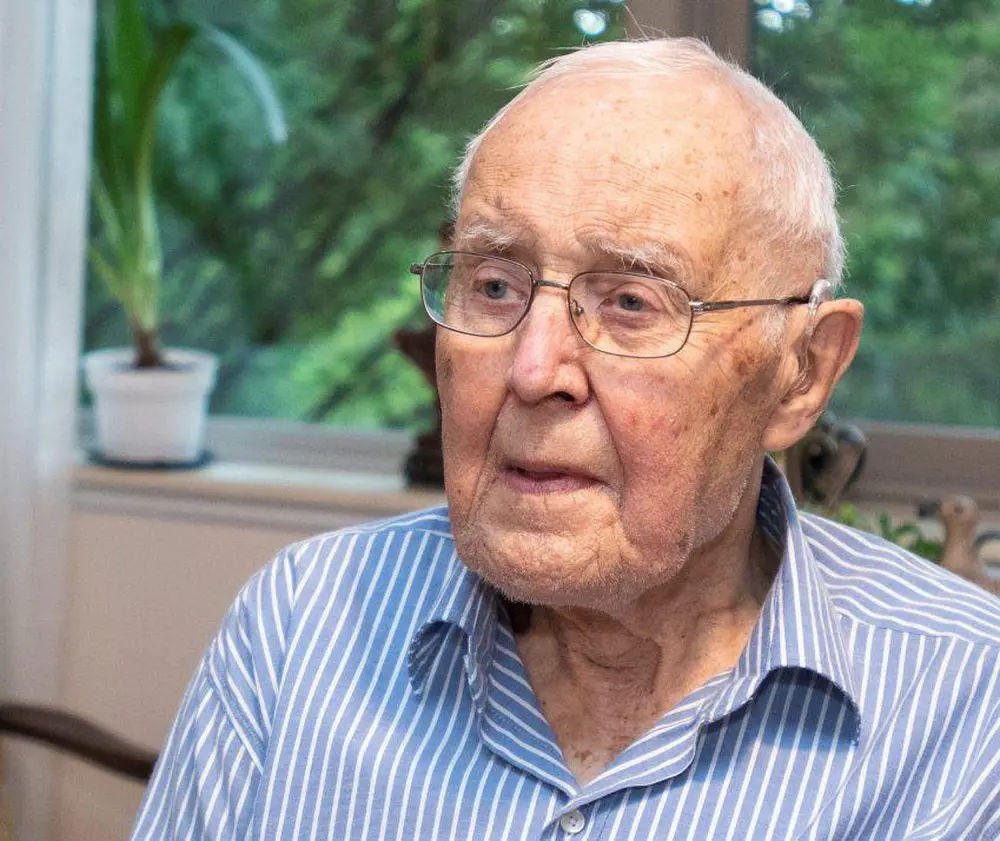
URBANA — Farmboy-turned-professor Winton Solberg has a middle career, as an Army officer.
University of Illinois Emeritus Professor Solberg, 97, landed on Omaha Beach in September 1944 — three months after D-Day, with fighting still going on.
He grew up near Aberdeen, S.D., and graduated early from the University of South Dakota, with infantry experience in the ROTC.
“My closest friend in college was killed in the war,” he recalled.
Early in life, he learned a key Army skill: how to make a bed properly, every morning.
“If you didn’t, they gigged you,” meaning a demerit.
Solberg graduated OCS, Officer Candidate School, on May 27, 1943, and began training troops.
Then it was off to sea, embarking from Boston on the USS Washington, where the second lieutenant had a comfortable berth.
“The ship zigzagged every two minutes,” he said, as a safety measure against German U-Boats.
It landed at Liverpool, whereupon his unit traveled by train to Southampton, one of the departure points for D-Day on June 6, 1944.
In September, Solberg was placed in a landing craft, commanded by a British officer.
Solberg said the craft couldn’t get close enough to Omaha beach, so the men waded ashore to the beach where so many had died.
He saw a vast cemetery with crosses and Stars of David, the American Cemetery overlooking the beach. Many former service members have made pilgrimages to it.
At night, he recalled, the Army traveled to Le Mans, taken by U.S. troops in August. Solberg and his men weren’t told where they’d go next.
They were soon put in boxcars, 40 and 8s, so called for the number of men or of horses they could handle.
“With backpacks and rifles, it was extremely crowded for the 40 men,” Solberg said.
On Oct. 13, they arrived in Belgium. Moving toward Aachen, a French city the Germans claimed as part of Germany.
The 29th Infantry Division could hear guns in the distance.
It was then that Solberg heard the now-familiar sound of an artillery shell heading toward a target — three or four feet away from him.
“It was a dud,” Solberg said. “Otherwise, I wouldn’t be here to tell the story.”
The near-death changed Solberg’s viewpoint.
“I developed the idea that I couldn’t spend every day worrying about death,” he said.
That was a very good thing, because in mid-December, the 29th Infantry was about to head into one of the bloodiest battles of the European theater, the Battle of the Bulge.
It was a last-gasp counter-offense by the Germans, whom Allied Forces thought were nearly defeated.
“All hell broke loose,” he said of the shock of artillery and airborne attacks. But his group persevered into Germany.
He was in Bremerhaven when the war ended. Conditions improved almost immediately; he was allowed to eat at a restaurant.
He lived in a house and “my aide got the food, and a cook served it.”
Solberg was a witness to the devastation of central Europe in the Army of Occupation, as well as some of the Nuremberg war crimes trials.
After the war, he stayed in the Reserves, but was accepted to Harvard and began a distinguished academic career.
During the Korean War, he was on the faculty at West Point, the prestigious Army university, leaving as a major.
Yale asked him to be a lecturer, and he found a tenured position elsewhere:
“When I got the offer to come to the University of Illinois, there was no hesitation.”
He came to Urbana in 1961, still in the Reserves until 1982, retiring as a lieutenant colonel.
Solberg served as chairman of the history department. Two years ago, he received the Chancellor’s Medallion, which had only been awarded six times over 20 years.
Reprinted from the News Gazette - July 8, 2019. Author: Paul Wood. Link to the original.